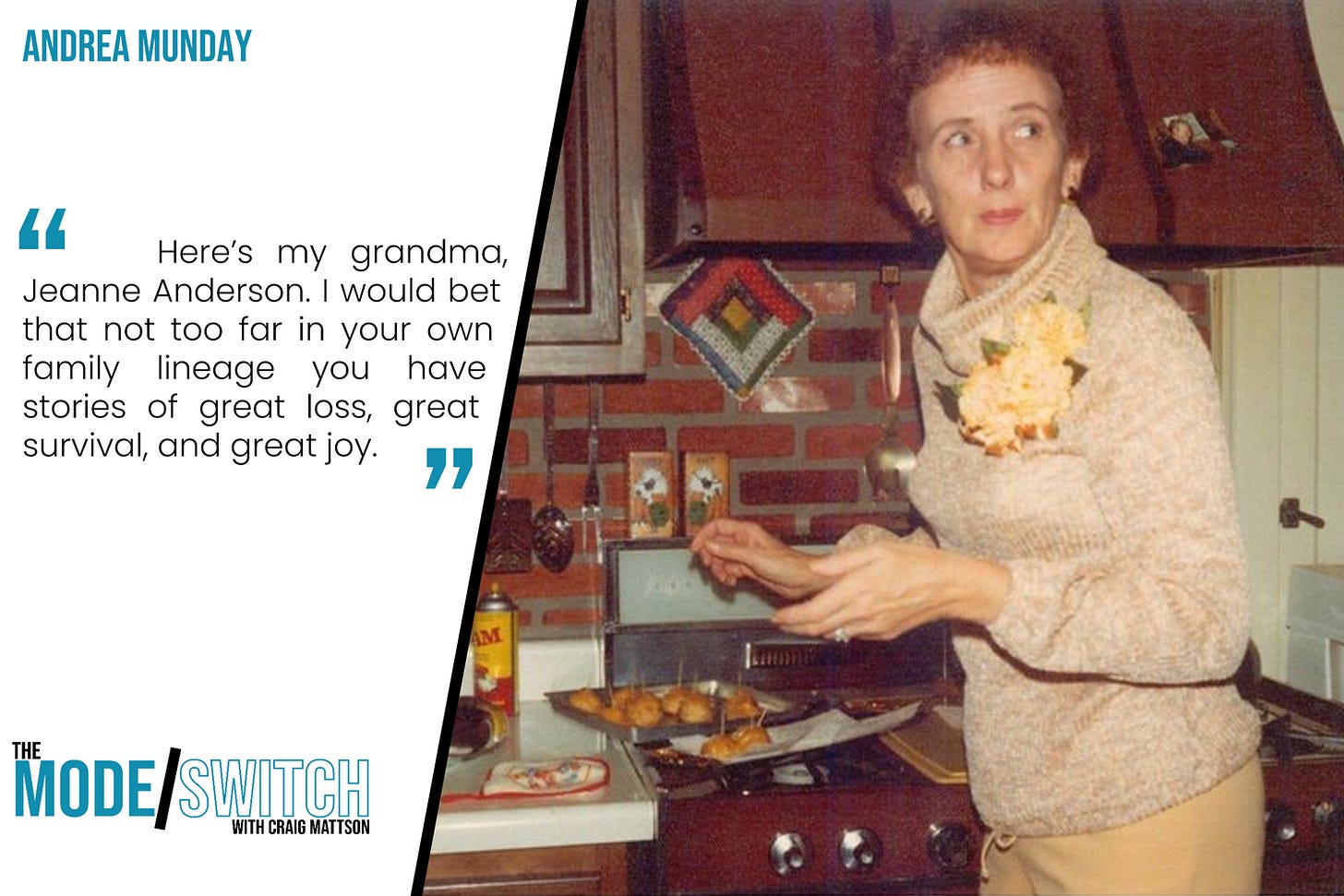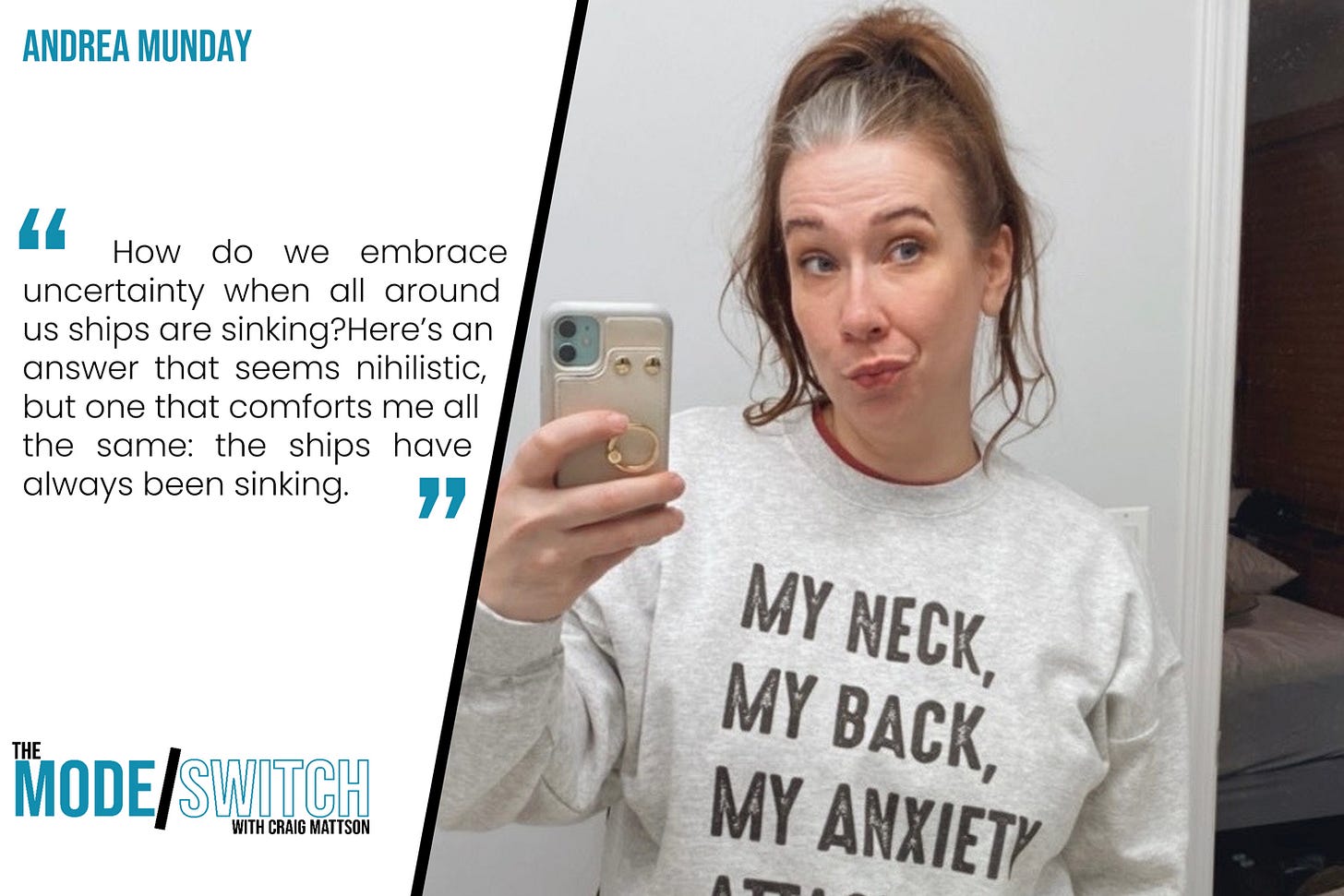Heads-up for Mid-Week Mode/Switch Content:
A 14-minute podcast on what your history gives you (besides trauma!) to survive your work and life.
Need some resilience today? Press play soon.
This week contributing writer Andrea Munday offers a follow-up to an unfinished (and probably unfinishable) conversation about precarious work in a chaotic world. I don’t know many people who speak with the rawness and compassion that Andrea brings to every exchange. Do yourself a solid and give this a read. - craig
A few weeks back, The Mode/Switch podcast discussed the possibility of a “career soulmate”. Emily Bosscher asked a question that’s been lingering in my mind - a question to which I gave an incomplete answer.
Can we really expect people to embrace career uncertainty when we’re surrounded by sinking ships? In other words, is it fair to tell struggling and precarious people, Hey, have a sense of adventure!
My response in the podcast was, “Try to see uncertainty as an opportunity.”
Ugh. I loathe that answer. It doesn’t seem much like an opportunity when we have the constant ringing of gunfire in our ears from the latest mass shooting, the climate crisis creating real-time and foreshadowed weather disasters, pandemics, wars, politics, hate crimes… the list goes on.
So how do we go on? How do we sit in our office chairs or walk the halls of our buildings and not feel a crushing meaninglessness in it all? What do we do when we feel stuck between the mess in our heads and the mess in our workplaces?
Here are two things that help me.
1. We are made of the DNA of survivors.
That’s putting it dramatically—but accurately, too. My grandmother was born in 1929 -the beginning of The Great Depression. She was orphaned by age 7. Her mother and baby sister died from Tuberculosis after a year quarantined in a sanitarium. Her father died shortly after from a brain aneurysm.
We were very close, and I grew up with her story as the foundation of my family. I often think about the trauma we’ve passed from generation to generation. We are a family afraid of abandonment. A family that lost culture, history, wealth, recipes, and stories.
But, too often I focused on the trauma that was passed down and not the resilience. My grandmother died at 91 - in a nice home, loved by her husband, surrounded by her children and grandchildren. She worked, and parented, and laughed, and had adventures.
I would bet that not too far in your own family lineage you have stories of great loss, great survival, and great joy. I can’t imagine the stories of tragedy, strength and love that come through immigrant, Black, indigenous or Jewish families.
2. We Grew Up in Precedented Times
“We’re in unprecedented times.” We hear it so often now. Those of us who grew up in the 80s and 90s experienced a deceivingly calm history. Especially those of us with privilege. Our political scandals were less serious, the economy fairly good, no school shootings, no major war. The crack epidemic, AIDS, police brutality, and sexual assault were all there, but many of us could pretend that mostly things were all right.
New York Times writer and historian Kurt Andersen says, “By the end of the decade, in fact, there was so much good news — a federal budget surplus, dramatic reductions in violent crime (the murder rate in the United States declined by 41 percent) and in deaths from H.I.V./AIDS — that each astounding new achievement didn’t quite register as miraculous.”
Then…
Columbine.
9/11.
The Iraq Wars.
The Great Recession.
The Pandemic.
So back to Emily’s question… how do we embrace uncertainty when all around us are sinking ships?
This is an answer that seems nihilistic, but one that comforts me all the same: the ships have always been sinking.
I would rather live in these times than the 1930s-70s when mothers had their sons and husbands drafted to war, or when children were placed in Iron Lungs to treat Polio. We’re not that far from the times when segregation reigned and women couldn’t vote. Hell, we’re barely getting to an era where we’re properly punishing rape.
As I sit at my desk and work on digital ads and logos, sometimes feelings of complete despondency creep up. I have intrusive thoughts of my children not coming home from school that day. I have to remind myself that my grandmother built a family from tragedy, and I won’t give up now.
I’m not here to tell you it’s ok. Or suck it up. Not at all. It’s not all on you. We have systems and work cultures that need to change. What I want to tell you is that you have the resilience you need to find joy in this pain, just like your ancestors did. The resilience to continue to provide for yourself and possibly your family, and build a life.
Here are some practical things that have helped me:
Turn off your news push notifications. Actually, turn off any non-essential push notifications. You know that isn’t good for your brain, right? You’re doing a task and a little notification pop ups about death and loss and tragedy. And they don’t stop, these notifications. No wonder we’re distracted, distressed, despondent.
Instead choose a time to check your daily news. I’m not suggesting to detach from what’s going on in the world. Susanne Babbel, a psychotherapist specializing in trauma recovery, says (strangely, in an article on CNN), “Constant exposure to trauma can derail our ability to cope healthily and hinder our ability to return to a relaxed state.”Don’t try to fix all the things. Pick a thing. We’re so overloaded with bad news that we are frozen in inaction, pulled from one disaster to another, not sure how to make an impact. This is where we should consider intersectionality - that all oppression is linked. Whatever corner of the world you’re trying to make better, if done so thoughtfully, will positively impact all those other parts you’re distressed about. And if we ALL choose SOMETHING, we can make an impact, instead of being dizzy in our pursuit of solving all the things.
Rely on community. In her Vox article “The world as we know it is ending. Why are we still at work?” Anna North says “Overall, surviving the disasters of the 21st century will require a new kind of strength from Americans — not the dogged persistence to keep doing our jobs while the world falls down around us, but the empathy and generosity to come together to stop the collapse.”
In my 20s I was poor and needed public health care, but was having severe anxiety attacks every time I entered the building to sign up. A very kind friend offered to come along next time and waited with me for 4 hours. Now in my 30s, my husband and I often have extra kids in our house after school hours because we work from home and some of our neighbors don’t. We need each other.Cast aside any criticisms of previous generations. We’ve all heard the trope “When I was your age I had to walk to school, uphill, both ways, in the snow.” Boomers and the generations before them have seen some shit, for sure. But so have we. Find older people who are telling you those stories not to diminish what you’re going through, but to say, “I survived this, and you can too.”
You are not weak for feeling despondent about working while the world is burning. Let yourself have those feelings. But also find your stories of hope - your survivor DNA.






